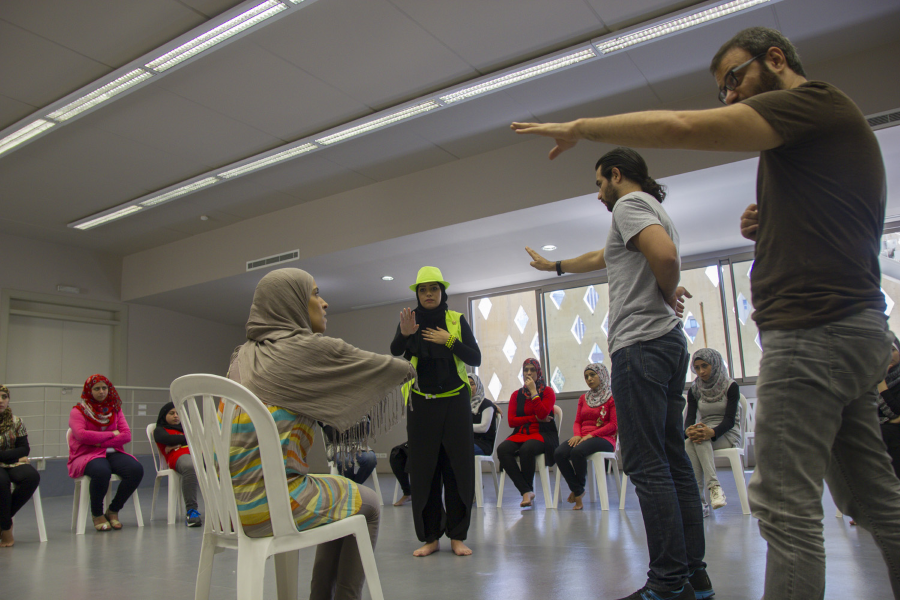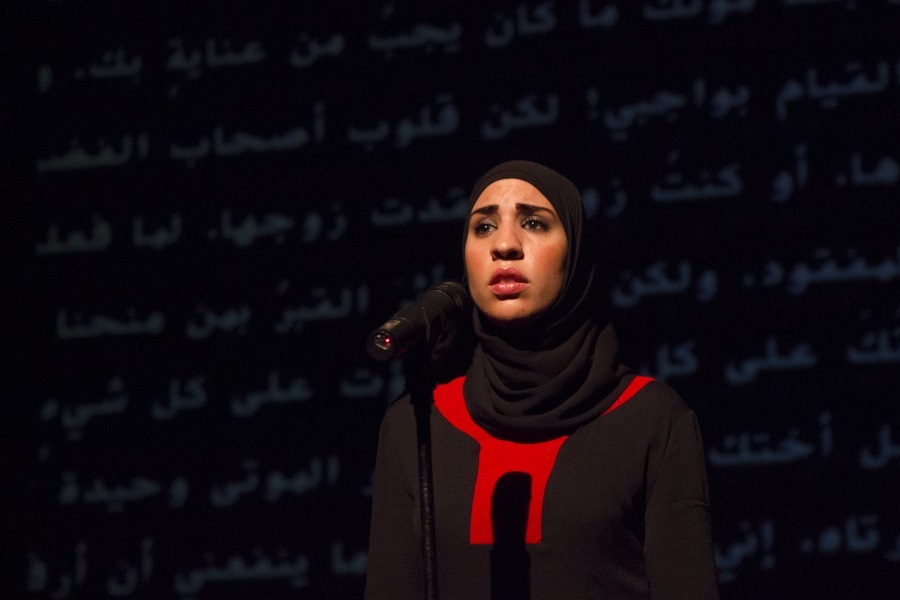BEIRUT, LEBANON: A single tear rolled slowly down Adam’s cheek. Caught in the bright glare of the stage lights hanging just feet above the Sudanese migrant worker’s head, the tear left a thin, dark trail down his face as he spoke.
Across Hamra Street, Beirut’s most famous avenue, at the Al-Madina Theatre—located in the heart of the bustling Lebanese city—there were more tears. They streamed freely down Nour’s face as she stood onstage, gazing out into the packed rows of darkened faces. The Syrian refugee’s headscarf grew damp with the tears falling from her chin.
Adam and Nour were born thousands of miles apart. But their stories have startling similarities. He was smuggled from Sudan over the mountains of Syria; she arrived in a rickety bus, escaping the shelling of Damascus. Beirut has become a haven for both of them. Adam was draped in the white salwa kameez of his native Sudan; Nour wore a simple black gown and headscarf common to the Muslim women of her Syrian homeland. They spoke with me about fleeing civil war in their respective countries and wept as they spoke of the senseless violence they had left behind.
But the Sudanese migrant worker and Syrian refugee have found themselves in a new society that considers them little more than an unpleasant reality of daily life. Tolerated but not welcome, acknowledged as unavoidable yet still invisible, their plights have melded into the mire of Lebanon’s own problems. Nevertheless, in Beirut, three NGOs have decided to put Lebanon’s migrant workers and refugees on a platform where their story has to be heard: the theatrical stage.
Two of these organizations—Catharsis and Aperta—are using drama therapy to help the region’s most marginalized. In May of this year, Catharis and a third NGO, the Migrant Workers Task Force, sponsored the reprise at Beirut’s Alt City performance space of Shebaik Lebaik, a collection of scenes performed by migrant workers that casts a light on the discrimination, exploitation and daily lives of foreign laborers in Lebanon. The show’s first production in December ’14 coincided with the staging of a reinterpretation of Sophocles’ Antigone at the Al-Madina Theatre by a cast made up entirely of female refugees from Syria. Both shows sought to give a voice to the country’s most disregarded populations.
In Lebanon, one in five residents is a refugee from Syria, and that community is repeatedly blamed for Lebanon’s ills, from security worries to the cleanliness of the streets. In a country of only 4.5 million, Lebanese homes and businesses host more than 200,000 sponsored workers from overseas. Unlike the typically Western expatriate community, these migrant workers enjoy few rights, have been banned from forming unions and suffer widespread abuse, including physical and sexual violence. One foreign laborer or domestic worker dies every week from unnatural causes.
In a country where the cultural scene is dominated by the French-speaking community or imports from the West, the stage is a surprising home for migrants and refugees—but both Shebaik Lebaik and Antigone aimed to quite literally cast these groups in a new light.
Hal Scardino, coproducer of Antigone, aimed to achieve this by staging the show in Beirut’s largest theatre. As he puts it, “We were hoping that people would see them not in the way that they see Shatila”—the slum district where many refugees spend their limited lives—“which is horrible and dirty and disgusting, but that it would be clear that they’re normal human beings—that they are beautiful and talented and have something to say for themselves.” (Scardino recalls his astonishment when one of the women in the show asked what Hamra was—even though Beirut’s most famous district lies just a few kilometers from where she lives with her husband.)
Often trapped by their families’ conservative expectations to remain within the domestic sphere and draconian government limits on access to the few jobs available, many of the female refugees endure stifling restrictions on their daily lives.
Migrant workers face similar pressures. Under the Arab “Kafala” system of sponsorship, where workers are tied to their employers, illegal practices of confiscating workers’ passports or denying them their weekly day off are worryingly common.
“The media sometimes portray a one-sided image of domestic workers as criminal or lazy,” explains Omar Harfouch, director of the Migrant Worker Task Force. He believes that Shebaik Lebaik amounts to “a very interesting opportunity for migrant workers to say their views out loud in front of the people like the Minister of Labor, who attended the show’s final performance.”
Unlike traditional plays, both performances centered on the actors’ own experiences and life stories.
On an empty stage, the Syrian women of Antigone stepped forward one by one, dressed in the headscarves common to most Muslim women in Syria, and recounted their tales of loss, desperation and struggle. The darkness of the scene was broken only by the striking flashes of red across their uniformly black abayas, or ankle-length cloaks.

Excerpts from the chorus of Sophocles’s tragic drama, chanted in unison by the cast, framed the women’s stories. In the soft glow of a reading lamp, one woman narrated the cast’s voyage from their first nervous rehearsal through to the cathartic release of conveying their own stories. “With an Arabic translation, the women were able to explore the relationship between the Greek tragedy and their own lives,” Scardino says. “Once it became clear to them that there were many, many parallels, that’s when they started to register that this was more than just rehearsals for a traditional play.”
For Hiba Sahli, a 23-year-old from the Yarmouk Palestinian camp in Damascus, the Theban heroine’s story was all too real. Two of her brothers have died in the violence of Syria’s self-destructive civil war, and one still remains unburied, a constant torment for the young woman. “If it was anyone else’s body I wouldn’t fight the rules, but for my brother, without a doubt, I would,” Sahli avows. “So I understand why Antigone does what she does.”
It was toward the end of Antigone’s 10-week rehearsal period that Scardino began to realize just how long would be needed to address the women’s traumas. “They started to tell their stories early on,” he explains, “but much was omitted—they were incredibly fearful of sharing certain details.” The stories of the actors in Shebaik Lebaik were no easier to coax out. “They were so shy,” says Catharsis founder Zeina Daccache, director of the play. “These are people who are not given the chance to voice their opinions.” But one by one they began to open up, supporting each other as they started to undo years of repression.
However, giving a platform to the marginalized didn’t go unopposed. “We must have looked at 20 or 30 rehearsal spaces,” Scardino says. “Some just said no flat-out. Others said, ‘You can rehearse here for $1,000 a day—that’s how much it costs to keep the lights on.’ It was their way of shutting it down, of closing their eyes to the problem.” For the migrant workers themselves, just getting to rehearsals was tricky. Under the Kafala system, their employers often had to consent.
Both productions hoped to change such attitudes, but perhaps their greatest success was for those onstage. Though the material facts of their lives have changed little, as the curtain fell for both Adam and Nour, the stage has given them something in short supply in this part of the world: hope. Both may now say, along with the narrator in Antigone, “We defied different Creons. And we still will.”
Joseph Ataman is a freelance print journalist based in Beirut. His work centers on religious minorities and the marginalized within Lebanese society.


